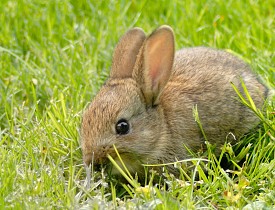Landscaping: The Waterless Lawn
 The green landscaping choice is always to go without a manicured lawn, unless it is functional and practical for, say, a play area for kids. But lawns don't otherwise offer many benefits and they use a ton of water. How much water does a lawn require to stay green? It depends on the size of your lawn, but according to the Handbook of Water Use and Conservation, the average lawn uses an estimated 10,000 gallons of water per year, not including rainwater.
The green landscaping choice is always to go without a manicured lawn, unless it is functional and practical for, say, a play area for kids. But lawns don't otherwise offer many benefits and they use a ton of water. How much water does a lawn require to stay green? It depends on the size of your lawn, but according to the Handbook of Water Use and Conservation, the average lawn uses an estimated 10,000 gallons of water per year, not including rainwater.
Nevertheless, the idea of the well-tended lawn is too ingrained in the American psyche for it go away anytime soon. With that in mind, are there ways to have one's cake and eat it too, or in other words, to have a waterless lawn?
The Grass is Greener
The zero-water lawn does exist with synthetic grass, the modern offspring of AstroTurf. I have seen a front yard completely redone with this product and I must say, it actually looks like real grass until you get within a couple feet. If you love the look of a neat lawn but water consumption and labor are your main concerns, this might be the option for you. It is perennially lush green, feels soft underfoot, matches yard contours, and never needs to be mowed or watered. Companies like SynLawn are producing it.
While you're saving water and labor, there are environmental drawbacks, though. To start with, synthetic lawns are made from a non-renewable, petroleum-based source that will one day wear down and end up in a dump. Also, I noticed that weeds tend to grow at the borders of the turf, which looks strange. And you're basically covering up your yard with a plastic sheet ... I would personally take a drought-tolerant native plant garden into consideration before going with synthetic lawn.
Going Green -- Naturally
If plastic grass is an option you're not willing to consider but your goal is still a zero-water lawn, you're out of luck. Sure, some varieties of grass require much less water than others (see below), but part of the natural cycle of grass in nature is to produce seed and then dry out and wait for the next rainy season. That means if you never water your lawn, it will not stay green on its own. However, the following are some options which require the least amount of water.
Bermuda grass
Bermuda grass, originally from Africa, is an excellent example. It can survive not only drought conditions and high heat, but also poor soil and foot traffic, because of its coarser stems and leaves and deeper roots than other grasses. However, because it spreads by rhizomes and stolons, Bermuda grass spreads vigorously and often builds up excessive thatch, which can lead to further problems. For all its good qualities, Bermuda grass does not handle shade or cold well and will die in climates with serious winters.
Zoysia grass
Another drought-tolerant grass is zoysia grass, originally from Southeast Asia. It spreads much slower than Bermuda grass and performs better in shade. However, it has rather stiff leaves that aren't comfortable to walk on and starts to look brown earlier in the fall and continues later in the spring than other grasses.
US Natives
Like other native plants, regional native grasses are adapted to local conditions, which includes local hydrological conditions. This is good news if you're looking for a grass that needs less watering on your part. After all, nobody was watering them in nature and they did just fine. The only "problem" is that in the natural course of events, un-managed grass does not stay green and short all year round. For that, some amount of watering and mowing is necessary.
If you're interested in a native lawn, you'll have to do research in your area. One example is buffalo grass, native to the prairies of North America (it was a food supply for buffalo). Drought- and heat-resistant, it is used as a turf grass.
Another variety is red fescue, native to California. Left to its own devices, it will take on a pleasant meadow look.
Jordan Laio writes for networx.com.
Updated August 21, 2018.
Looking for a Pro? Call us (866) 441-6648

Landscaping Average Costs
Landscapers Experiences

Hiring A Great Landscaper Was Almost Too Easy, Even Long Distance

“Stealth” Tree Trimming Was An Incredibly Clean Job



